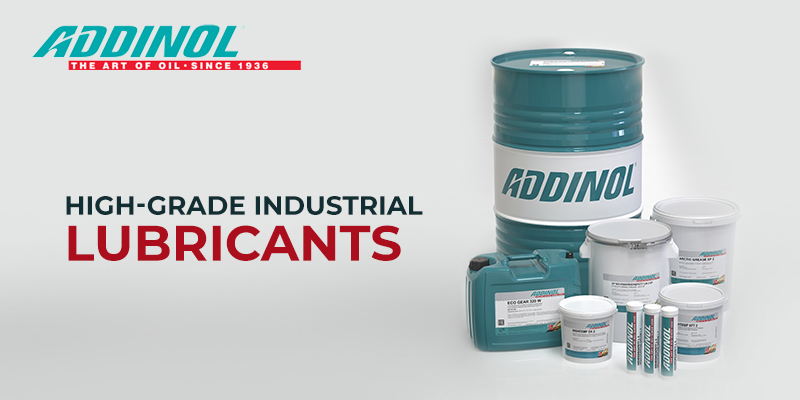Industrial lubricants are indispensable assets in optimizing machinery efficiency and extending equipment lifespan. These highly specialized lubricants are designed to tackle challenges like friction, heat, and wear and tear, ensuring the uninterrupted performance of essential components.
Industrial lubricants are employed across diverse industries differently to achieve operational excellence. In manufacturing, these lubricants are instrumental in enhancing the functionality of gears, bearings, and moving parts, resulting in heightened productivity and minimized downtime. The automotive sector relies on industrial lubricants to maximize engine and transmission performance, boosting fuel efficiency and vehicle reliability. In the energy industry, these lubricants are important for the reliable operation of turbines, compressors, and various equipment, facilitating continuous power generation. In the food sector, they are used to lubricate the engines for operational efficiency and heightened productivity. Thus the strategic use of high-performing Industrial Gear oils will not only ensure achieving peak performance but also sustainability goals in the long run.
In this article, we shall discuss more about high-grade industrial lubricants, their advantages, etc.
What is an industrial lubricant?
An industrial lubricant is a special substance used on moving surfaces to reduce friction and wear. It does more than just that – it also helps seal, transfer heat, prevent corrosion, and trap contaminants in machinery. In simple terms, these chain lubricants keep things running smoothly and protect machines from damage.
Types of Industrial Lubricants
Industrial lubricants encompass various types customized for specific applications in machinery and equipment. Here are some common categories:
Mineral Oil Lubricants:
Derived from crude oil, these are versatile and suitable for general-purpose applications. Ideal for machinery operating under normal conditions due to good viscosity and stability.
High-Performance Industrial Gear Oils:
Specifically formulated for closed industrial gears of different constructions. Ideal for mild climates and constant temperature conditions. Applicable in industries such as steel, mining, and cement, suitable for lubricating rollers and sliding bearings.
High-Performance Synthetic Industrial Gear Oils:
Synthetic oils with Surftec technology for mechanically and thermally heavily loaded gears. Ideal for varying temperatures and applicable in industries like wind turbines, mining, and extruder gears. Offers longer oil change intervals, low thermal stress, and excellent wear protection.
FoodProof VDL 100 S – Top Quality Compressor Oil for Food Industry:
Formulated using Polyalphaolefin (PAO) as its base, ensuring biologically safe components. These food-grade lubricants are specifically designed for optimal lubrication of various compressor types in the food industry.
Adheres to NSF H1 standards, making it suitable for applications demanding superior lubrication standards in the food, feed, cosmetics, and pharmaceutical industries.
Advantages of Using High-Grade Industrial Lubricants
Reduced friction: High-grade lubricants create a protective film that minimizes direct metal-to-metal contact, effectively reducing friction between moving components.
Optimized Performance: Smooth and uninterrupted machinery operation is achieved, leading to lower energy consumption, decreased heat generation, and thereby enhanced performance.
Increased Productivity: Well-lubricated machinery experiences fewer breakdowns, resulting in less downtime for repairs and maintenance, contributing directly to increased productivity.
Extended Machine Life: By preventing wear and tear, high-grade lubricants contribute to a reduction in operational disruptions, minimizing breakdowns and unexpected maintenance issues.
Minimized Maintenance cost: Extended equipment lifespan results in significant cost savings by minimizing the need for frequent replacements and reducing downtime.
Specialized Solutions for the Food Industry: High-grade lubricants adhere to rigorous regulations and standards in the food industry, ensuring cleanliness, safety, and compliance with food processing requirements and packaging activities.
Lower Fuel Consumption: Reduced friction between moving parts results in less heat generation and lower fuel consumption, contributing to improved efficiency of engines and reduced emissions.
Environmental Considerations: High-grade lubricants often feature formulations that address environmental concerns, including biodegradability and pollution reduction.
FAQs about High-Grade Industrial Lubricants
1: What are the benefits of using high-grade industrial lubricants?
High-grade industrial lubricants offer multiple benefits, including minimizing wear and friction between moving parts. They create a protective layer that not only extends equipment lifespan but also reduces the frequency of repairs and maintenance. These lubricants also help disperse heat generated during operation, preventing machinery from overheating and sustaining damage.
2: What type of lubrication is generally used with most industrial gears?
For most industrial gears, grease lubrication is suitable, especially at low speeds. Exceptions include situations where splash lubrication and forced oil circulation lubrication prove more effective for medium and high speeds. There are occasional uses of grease lubrication even at high speeds for specific maintenance purposes.
3: How should industrial lubricants be properly stored and maintained?
Proper storage and maintenance of industrial lubricants involve ensuring an adequate supply to avoid waste and prevent shortages during peak production. Use high-quality containers to shield lubricants from contaminants, and store them in a cool cabinet or shelf for accessibility. Carefully manage container fill levels—store less than half full during warm months to accommodate expansion and contract, and fill each container three-quarters full to allow for proper expansion and contraction.
4: What factors should be considered when selecting high-grade lubricants?
A: When choosing high-grade lubricants, factors like operating conditions, temperature range, and load capacity must be considered. Compatibility with materials, resistance to oxidation, and environmental impact are crucial. Adherence to industry standards and manufacturer recommendations should also be considered as it ensures optimal performance and equipment longevity.
5: How do high-grade lubricants contribute to machinery efficiency?
High-grade lubricants contribute to machinery efficiency by reducing friction, minimizing wear on moving components, and creating a protective film. This results in smoother machinery operation, lower energy consumption, decreased heat generation, and improved performance, directly impacting the productivity and reliability of industrial equipment.
So, what are you waiting for, book your high-performing industrial lubricant from a Lubricant Supplier in India and ensure extended machine life for your industrial machinery.



